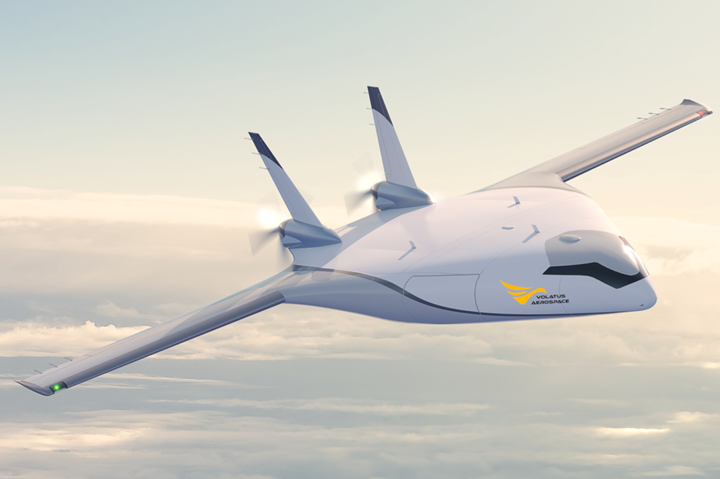Natilus blended wing freighter secures first order
Large autonomous cargo drone freighter, Natilus N3.8T, comprises a carbon fiber airframe, offers 60% more cargo volume than same-weight aircraft and reduced cost and emissions by 50%.

The Natilus N3.8T composite cargo aircraft. Photo Credit: Volatus Aerospace
Volatus Aerospace Corp. (Toronto, Ontario, Canada) has secured the first production delivery slot for the Natilus N3.8T large blended wing autonomous drone under development by startup company Natilus Inc. (San Diego, Calif., U.S.).
Natilus’ large autonomous cargo drone freighters are designed to dramatically reduce both the cost and environmental impact of air freight. The company is currently developing three products, all with carbon fiber composite airframes. The first is a 19,000-pound aircraft with a 90-foot wingspan, which was slated to begin production in late 2021. The second is a 60-ton aircraft, said to be similar in size to a Boeing 767, targeted for domestic service in the U.S. but also capable of serving Europe and Asia. The flagship product is a 700-ton competitor to the Boeing 777 with a 10% larger wingspan, capable of trans-Pacific flight.
The Natilus N3.8T, specifically, is a twin-engine turboprop that will have a maximum takeoff weight of 8,618 kilograms (19,000 pounds), a maximum range of 1,667 kilometers (1,035 miles) and is expected to carry a load of LD3 containers to a maximum weight of 3,855 kilograms (8,500 pounds).
To increase the aircraft’s efficiencies, Natilus integrates three specific technologies: A blended wing body (BWB) design, remote-pilot operation and standard container standardization. The Natilus N3.8T offers an estimated 60% more cargo volume than traditional aircraft of the same weight while reducing costs and carbon dioxide per pound by 50%, Natilus contends. The aircraft has completed the second wind tunnel test and is expected to begin deliveries in 2025.
“In November 2021, we announced the expansion of our existing drone services business into the drone cargo market with the introduction of the fully autonomous drones produced by Avidrone [Ontario, Canada],” says Glen Lynch, CEO of Volatus. “The recent amalgamation with Partner Jet Inc. [Ontario, Canada] gives us the commercial infrastructure to operate drone cargo services, and the addition of Natilus aircraft establishes the long-term direction for our aviation division.”
“We are already an experienced commercial air carrier with operating authorities and licenses facilitating cargo delivery using both piloted aircraft and drones. We believe the planned addition of these large autonomous drones will allow us to develop important airline partnerships within the air cargo industry,” adds Luc Masse, executive VP of Volatus and CEO of Volatus’ wholly owned subsidiary Volatus Aviation (formerly Partner Jet Inc.).
Volatus Aviation’s primary mission is to leverage its current business jet charter operation into drone air cargo, beginning with small package delivery and growing into regional airfreight with the addition of the remotely piloted Natilus N3.8T in 2025.
Related Content
-
PEEK vs. PEKK vs. PAEK and continuous compression molding
Suppliers of thermoplastics and carbon fiber chime in regarding PEEK vs. PEKK, and now PAEK, as well as in-situ consolidation — the supply chain for thermoplastic tape composites continues to evolve.
-
Welding is not bonding
Discussion of the issues in our understanding of thermoplastic composite welded structures and certification of the latest materials and welding technologies for future airframes.
-
The lessons behind OceanGate
Carbon fiber composites faced much criticism in the wake of the OceanGate submersible accident. CW’s publisher Jeff Sloan explains that it’s not that simple.
















